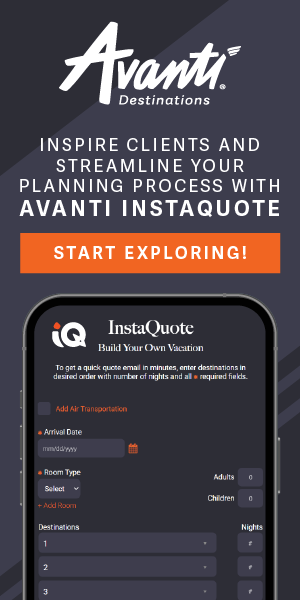How Travel Agents Can Meet The New Artificial Intelligence Challenge
by James ShillinglawIsche: “Only a travel agent can unleash the power of genuine intelligence.”
If there’s one thing the travel agency community has had to deal with constantly, it’s market disruption. From Airline commission cuts to online travel booking to the Internet, agents have had to adapt their businesses to new market realities. But now there’s another disruptor on the horizon—artificial intelligence, or AI.
At least that’s what John Ische, president and CEO of travel technology provider Tripsept Solutions, told agents attending last month’s ASTA Global Conference in Reno. According to Ische, agents have been dealing with disruption for a long time and it’s not necessarily something to worry about.
“The last major disruption was the Internet,” Ische said, where consumers could buy travel directly online. “Agents had to create a new value proposition…centered around travel intelligence” to provide access to the best travel suppliers, policies, deals, bucket list destinations and more. They developed CRM (customer relationship management) systems so they could have a bank of knowledge about their customers.
Meeting the new challenge
But that won’t be enough in the future, Ische said. “By 2020…travel agents will be left behind” unless they can meet the challenge of new “artificial intelligence” systems that are being created. He quoted Expedia chairman Barry Diller as saying “artificial intelligence will be travel’s next big thing.” Indeed, Expedia, Google, Facebook, Apple and other major online powerhouses already have AI systems that they are developing, refining and enhancing.
“The technology being developed will empower professional travel agents and make them smarter…and better able to serve their clients.”
“Truly artificial intelligence is already affecting how we live our lives as consumers,” said travel industry analyst Henry Harteveldt, founder of Atmosphere Research Group, who spoke on a panel after Ische’s presentation. “The technology being developed will empower professional travel agents and make them smarter…and better able to serve their clients.”
These new artificial intelligence systems effectively mimic human behavior so they can answer travel questions, whether typed in on a screen or spoken, and come up with solutions based on analysis of a customer’s previous travel habits, as well as the products and destinations that best fit their travel preferences. They also can “learn” based on their interactions with customers. “This will hit all aspects of our lives,” Ische said. “Technology companies are making huge investments in this new technology.”
To meet the AI challenge, Ische says agents need to better engage and communicate with their customers to get a deeper understanding of how they live and interact with the world. They need to elevate their customer intelligence and turn it into what he calls “genuine intelligence,” which will lead to higher sales close rates, greater travel spend and more qualified yields.
Getting genuine intelligence
Ische defined genuine intelligence as equaling travel intelligence times customer intelligence times artificial intelligence, all fueled by the travel agent. But agents need to ask a whole new set of questions so they can truly understand their customers and become an indispensable resource for them. “Who else but you can plan a vacation for tomorrow’s sophisticated traveler,” Ische said to ASTA agent attendees. “Only a travel agent can unleash the power of genuine intelligence.”
Ische said Trisept Solutions has been engaged over the past several years in developing an AI system that agents can use to better engage with their clients. The company is perhaps best known for VAX VacationAccess, which allows small and independent agents to book packages, tours, resorts and cruises online without using a GDS. Some 70,000 agents currently use VAX to book vacation products with more than 50 travel suppliers.
Trisept’s New Product
Last year Trisept introduced a new travel agency management tool called Xcelerator, which agents can use to develop stronger relationships with their customers. Ische said over the past year more than 1,500 agents have been testing the tool, which essentially can replace such database and CRM products as ClientBase.
This October Trisept debuted Discover, a new function within Xcelerator that allows travel agents to plan leisure travel using artificial intelligence that helps them match the right vacation product to their clients’ needs. Discover was developed by WayBlazer, a company that integrates IBM Watson artificial intelligence for the travel industry to create a more intuitive interface with customers. “The whole concept of artificial intelligence is it gets smarter and smarter,” said WayBlazer CEO Felix Laboy, who also spoke on the panel after Ische’s presentation. “Artificial intelligence can help you find that [product] information faster and provide a better experience.”
When searching for vacation product using Discover, agents can type in a description of what their client is seeking and the system will provide products that match those needs. “Discover matches the client to the perfect vacation,” said Ische. “It streamlines your search and all functions are integrated.”
Right now Discover searches only the VAX hotel and cruise vacation products offered through Xcelerator, but it is set to expand in the future to cover a greater range of products and destinations.
Providing more value
As Discover and other tools based on artificial intelligence develop further, the message is clear: Agents need to use this technology to provide more value to their clients. “Artificial intelligence can help you do your job better,” said Harteveldt, because it can eliminate the time agents spend on searching for specific travel products that match their clients needs—and that makes you that much more relevant to your clients.”
Artificial intelligence also can help agents with the complexity of travel products available today, because there are simply too many different product types, categories and options. “Products are getting much more complicated and I think technology can help navigate that complexity,” said Andy Stuart, president and CEO of Norwegian Cruise Line, who also spoke on the panel.
But travel agents also need to recognize the benefits of the new AI technology. “All of this intelligence is going to help you better understand the client,” said Joanie Ogg, co-founder of Ogg Marketing Group, another panelist. “We can build the trip of their dreams, but we have to be willing to open our eyes…It’s time for travel agents to change again.”
























